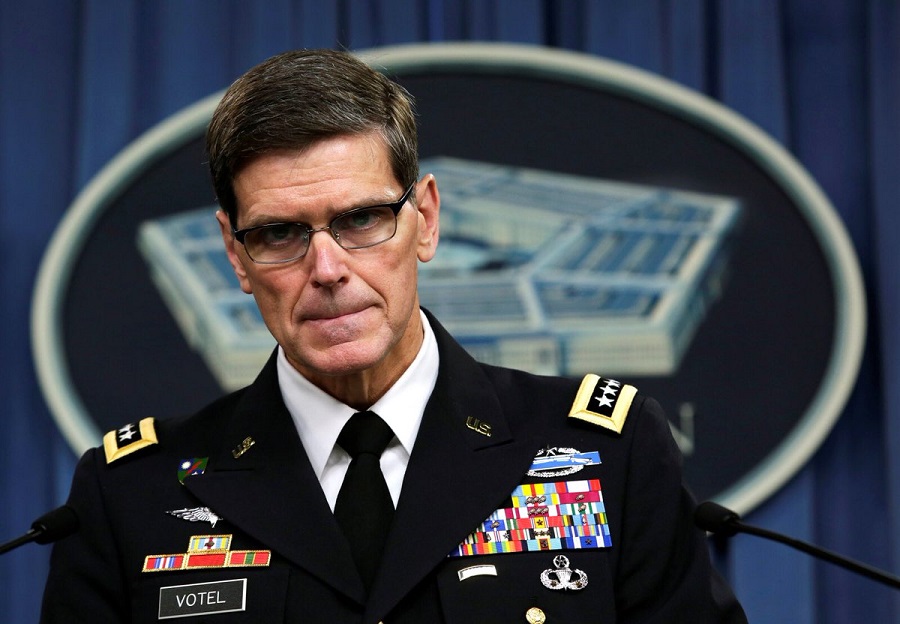Joseph Votel, a four-star American general who heads the U.S. Central Command and testified before the United States’ Senate Armed Services Committee on Tuesday, said during his hearing in Washington that Kazakhstan must carefully balance cooperation with the U.S. to avoid any action that its neighbor Russia could interpret as being threatening.
“Kazakhstan and U.S. relations continue to be the most mature and forward-thinking in Central Asia, although Russia’s proximity influences Kazakhstan’s posture,” Votel said in his official statement.
Votel did not mask the U.S. military’s intention to lure regional capitals away from signing Russia arms deals and persuade it to buy American-made weapons.
“As we look to off-ramp Central Asian countries from Russian defense equipment, the higher price of U.S. systems will remain a challenge for nations like Kazakhstan,” he added.
Washington sees Kazakhstan as a reliable Central Asian contributor to stability in nearby Afghanistan. Kazakhstan has long been engaging in trade, providing electrical power, donating money, providing educational opportunities, supporting programs for Afghan women, and offering technical support and services to the Afghans.
As a former Soviet republic, however, Kazakhstan has traditionally aligned itself with Russia, the largest economy in the Caspian region and the strongest military power. Following the USSR’s collapse in 1991, the two helped found the Commonwealth of Independent States – a regional intergovernmental organization of 10 post-Soviet countries. Both are also members of the Collective Security Treaty Organization, a NATO-like conglomerate of post-Soviet states that currently includes Russia, Kazakhstan, Armenia, Belarus, Kyrgyzstan and Tajikistan.
Kazakhstan is ranked one of the largest and oldest operators of Russian military equipment, meaning luring it off of Russian-made arms could be lucrative for the American military-industrial complex.
Eighty percent of Kazakhstani military-technical purchases are imported from Russia, which is considered the second-largest military power in the world after the U.S. Over the last 25 years, Kazakhstan has spent more than $1.3 billion to buy Russian-made arms. In recent years Kazakhstan purchased Russian-made lightweight MiG-29 fighters, Su-25 attack aircraft, Su-27 and Su-30MK fighters, as well as IL-76 military transport planes, BTR-80 armored personnel carriers and the BTR-80A.
However, Kazakhstan has also purchased military equipment from NATO member states as well. The country currently operates French-made radars and Super Cougar transport helicopters, as well as the Eurocopter EC145 from Germany. Astana has also bought some military and non-military equipment from Spain, Turkey and Ukraine. The only American made equipment sent to Kazakhstan to date have been second-hand helicopters used in anti-terrorism programs.
Votel’s remarks to the Senate panel on Tuesday come amidst rising tensions between Washington and Moscow after U.S. President Donald Trump announced last Friday that the U.S. was suspending its involvement in the Intermediate-Range Nuclear Forces Treaty with Russia. Inked in 1987, the pact was expected to ease a crisis that erupted after American and Soviet missiles were placed within range of European capitals.
Officials in Washington have for long accused Russia of violating the treaty, while some Russian experts believe the U.S. has been creating false allegations as a pretext for leaving it. One day after Trump announced the U.S. was leaving, Russia suspended its involvement in the INF as well, raising concerns about a new arms race.
Kazakhstan, which is also a party to the INF treaty, has called on the parties to negotiate.
“Kazakhstan stands for the preservation and strict observance of the treaty by all parties, and also confirms its unchanged value as a unique historical agreement that allowed the parties to eliminate a whole class of missiles capable of carrying nuclear weapons and make significant progress in nuclear disarmament,” reads an official statement posted to the foreign ministry’s website.
As the largest country in Central Asia and a former Soviet republic, Kazakhstan has long been pursuing a policy of disarmament and non-proliferation of weapons of mass destruction (WMD).
After the Soviet Union collapsed in 1991, Kazakhstan inherited some intercontinental ballistic missiles (ICBMs) from Soviet missile complexes based on Kazakhstani territory. But five years later, in 1996, ICBMs were transferred to Russia for dismantlement. Missile silos and silo structures were destroyed under the U.S. Department of Defense Cooperative Threat Reduction (CTR) program by 1999.







 President Aliyev emphasized the critical role of the North-South Transport Corridor in fostering transport cooperation between Azerbaijan and Russi...
President Aliyev emphasized the critical role of the North-South Transport Corridor in fostering transport cooperation between Azerbaijan and Russi...
 Russian Foreign Minister Sergei Lavrov has reasserted that Moscow has no intentions to stop the fighting in Ukraine, even if peace talks commence.
Russian Foreign Minister Sergei Lavrov has reasserted that Moscow has no intentions to stop the fighting in Ukraine, even if peace talks commence.
 Iran has refuted reports of alleged damage to Shimon Peres Negev Nuclear Research Centre located southeast of Dimona, Israel, during the recent air...
Iran has refuted reports of alleged damage to Shimon Peres Negev Nuclear Research Centre located southeast of Dimona, Israel, during the recent air...
 Iran and Pakistan have signed eight cooperation documents in various fields, and agreed to strengthen ties to fight terrorism in the region.
Iran and Pakistan have signed eight cooperation documents in various fields, and agreed to strengthen ties to fight terrorism in the region.



